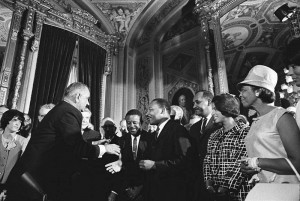When Dr. Eugene Barrington retired from Texas Southern University, he took the saying, ‘it’s better to give than to receive’ to heart. On August 31, 2012 he bid his adieu to his position as a professor of Public Affairs and Public Administration but his impact on his students continues to reach a year after his departure.
The good news of Sanford, Florida is Dr. Barrington. College graduate, a US Air Force veteran, an employee for the federal government, career developer for the AFL/CIO, educator and a worker inside of his church, Wheeler Avenue Baptist, he has accomplished much during his years working. Now that he has retired he is helping others in their career so they may be as successful as he.
“They gave me $8500 for my retirement and I gave it all away,” said Dr. Barrington. “Don’t ask me how or why but I just felt honored.”
His giving started immediately as he accepted donations for the Buffalo Soldiers National Museum at his retirement party. He also gave to the Smithsonian National Museum of African American History and Culture, in which he is a charter member, Sound Doctrine Ministry received a donation as well as three of Barrington’s former students at Texas Southern University, Angela Cohen of Children’s Health Academics and Safety, Inc. in Arlington, TX, Dana Smith of Texas Area Health Education (AHEC) East- Greater Houston Region and Dr. Reagan Flowers of C-STEM, Inc. in Third Ward.
“Reagan came to teach in my class a couple of times and Dana Smith as well,” said Barrington. “But I gave to the Buffalo Soldiers because I believe the story of the US military should be told, and particularly the Black US Military.”
The works of his students aligned with his passions in the public policy sector so he didn’t hesitate to help his former students in their work. The work Dana Smith does with Health Services in Arlington is important to Barrington as he volunteers at the Veteran Hospital and knows the struggle people have with health care.
“Dr. Barrington gave us a $1,000 and we are very grateful for it,” said Smith. “It’s difficult in the non-profit sector to get the funding you need to really make the impact you want to make in the community.”
Barrington had no problem donating the money as he saw it as a little seed money to help them make improvements in the things they have already started.
“C-STEM produces an excitement for learning and you know Dr. Flowers has implemented the C for communications in the program which is needed because it is something that is sorely lacking in the community, the ability and willingness to communicate effectively amongst ourselves and others,” said Dr. Barrington.
After a year of retirement Dr. Barrington is still on the go. He is traveling, while volunteering his time still at the V.A., with the church and with those older than he. He is a lifetime educator as his students still seek him out for advice and clout. He is as sharp and witty as a twenty year old but admired as the elder he is. After 35 years teaching at Texas Southern University he gave his parting gifts to the legacy he helped build so they too may be able to have a story like his someday.





